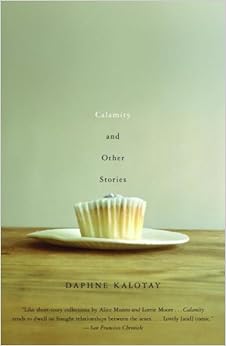A collection of twelve mostly loosely interrelated tales involving characters headed ultimately to a wedding, Kalotay does a good job of presenting middle-class life and concerns. These are well-written pieces that I am not surprised to see in print. They tell contemporary stories well, but they don't revolutionize the form or do anything else that might make them differ from other polished work.
"Serenade" recounts a girl's experiences with her piano teacher, who her next-door neighbor best friend also has for tutoring. The teacher is an artist of sorts, an effete musician, who appreciates all things beautiful, most especially women, in a somewhat lecherous way. But there's more going on than initially meets the eye, and not all of it involves the teacher, who essentially plays the part of a voyeur.
"A Brand New You" concerns a woman who meets her ex-husband (from eight years before) and ends up bedding him, even as she is trying to change her life, to become someone better than she used to be. What she finds, however, is a man who himself is on the decline, his good looks--his main attraction when a younger man--fading. There's certain poignancy in this story, the way this woman recognizes in the man weaknesses and sorrows that she hadn't seen before, ones that mirror some of her own.
Many of Kalotay's stories end on something of a subtle twist. That's the case with "All Life's Grandeur," which focuses on a teen forced to spend the summer with his father and his father's new love--and with an eleven-year-old girl whose devotion and friendship the teen dismisses and dislikes. There's a lot of sorrow in this story, wisely delivered.
That quiet despair is also part of "Prom Season," in which boys are told they must bring dates to the prom, and one, Mack, learns that there are things more important than getting the girl you want, things that can cause you to lose all you set out to accomplish.
The next several stories didn't hold my interest as much, as if having hit her stride, Kalotay was simply skating along traditional themes. The last and weakest of these, “Anniversary," focuses on women getting together for drinks to talk about a son's impending wedding to the "wrong girl." This was the first time I got the sense that the characters in these stories might be linked, as the name of a dropped girlfriend corresponded to the name of the woman in the previous story, and the name of the son corresponded to the boy in "Prom Season." The two women talk of love, and one of them thinks a lot about a dead husband. Thematically the story fit in well with the tales in this section of the collection, but I didn't feel like this piece really went anywhere. The main topic of the son Mack is almost completely dropped by the story's end as the piece changes focus to the dead husband.
"Snapshots" involves a wife's complaints about a house that her husband likes for its views and location. At times, there are wonderful moments in the marriage, like snapshots, but we get the sense that the marriage is ultimately doomed. A next-door neighbor holds much curiosity for the couple--the husband tries to figure out where the neighbor works, the wife goes with the neighbor into his house (the husband suspects there might be an affair occurring). The neighbor builds a tunnel into a closet in the couple's house, where he hides from time to time from the law. I thought this story, as odd as it was, seemed a good, realistic summary of a couple's relationship.
"Difficult Thoughts" does an intriguing thing insofar as Kalotay does not follow the usual script for a work that involves a majorly otherworldly detail. Most of the time, the story would focus on the odd turn of event that occurs in the tale; instead, Kalotay uses the event to bring the story to a close, leaving us uncertain to an extent as to its reality. The tale itself is about a woman student (Rhea, of "Allston Electric," among others) in Italy who falls for a pair of brothers who turn out to be playboys of a sort. Are they to be believed?
"Rehearsal Dinner" ruminates on love and breaking up and on how essential it is to have a significant other. It does so through a focus on Geoff, who a year earlier dropped a girl and who has been avoiding relationships since and how he comes to see a couple who pick him up on his visit into town and how natural they seem to fit together.
The title story, “Calamity,” is one of the better ones in the collection and sets up well the last, "Wedding at Rockport," which brings the characters from the various stories together, which proves an interesting way to construct the book. Knowing the background of the various peoples at the wedding makes for a different reading than one would make without the eleven stories preceding. A drunk maid of honor, for instance, is much more sympathetic when one knows the experience through which she's just passed. And that is really what is the most redeeming part of this collection, which does what great story cycles do--it builds little by little something much greater than the sum of its parts. It gives us a sense of a community of characters.
Monday, September 12, 2016
On "Calamity and Other Stories" by Daphne Kalotay ***
Labels:
Books,
Collections,
Daphne Kalotay,
Three-Star Collections
Subscribe to:
Post Comments (Atom)







No comments:
Post a Comment